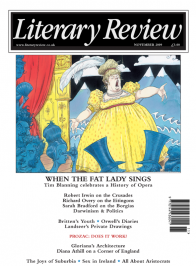Allan Massie
News That Stays News
I thought of Charles Garvice the morning after the Man Booker Prize. I wouldn’t have done so if I hadn’t recently been reading Maugham’s A Writer’s Notebook. Indeed, it is only on account of a paragraph there that I know of his existence. There is no entry for him in either the DNB or The Oxford Companion to English Literature. Yet, according to Maugham, ‘he was read by every servant-girl, every shop-girl in England, and a great many people besides’. Someone once asked him at the Garrick Club how many copies of his books had been sold. At first he declined to answer, for he was, Maugham says, ‘a modest, unassuming, well-mannered man’. Then, being pressed, he said, ‘seven millions’.
It was the BBC’s Ten O’Clock News report of the Booker Prize that made me think of Garvice. First they had Jan Dalley tell us that ‘the literary novel is a genre like any other’, and then they had figures showing that, while Booker-winner Hilary Mantel’s Wolf Hall

Sign Up to our newsletter
Receive free articles, highlights from the archive, news, details of prizes, and much more.@Lit_Review
Follow Literary Review on Twitter
Twitter Feed
How to ruin a film - a short guide by @TWHodgkinson:
Thomas W Hodgkinson - There Was No Sorcerer
Thomas W Hodgkinson: There Was No Sorcerer - Box Office Poison: Hollywood’s Story in a Century of Flops by Tim Robey
literaryreview.co.uk
How to ruin a film - a short guide by @TWHodgkinson:
Thomas W Hodgkinson - There Was No Sorcerer
Thomas W Hodgkinson: There Was No Sorcerer - Box Office Poison: Hollywood’s Story in a Century of Flops by Tim Robey
literaryreview.co.uk
Give the gift that lasts all year with a subscription to Literary Review. Save up to 35% on the cover price when you visit us at https://literaryreview.co.uk/subscribe and enter the code 'XMAS24'